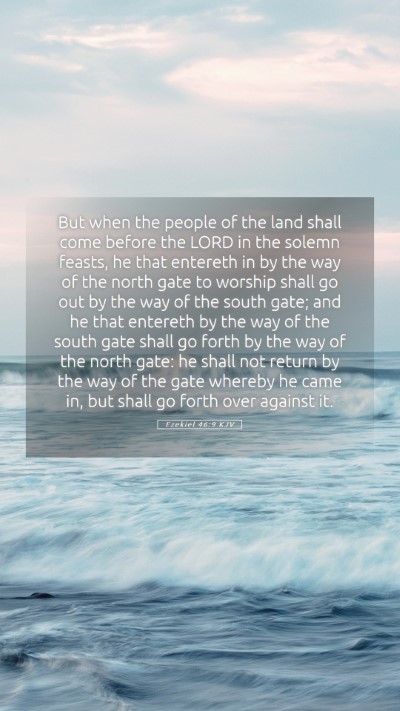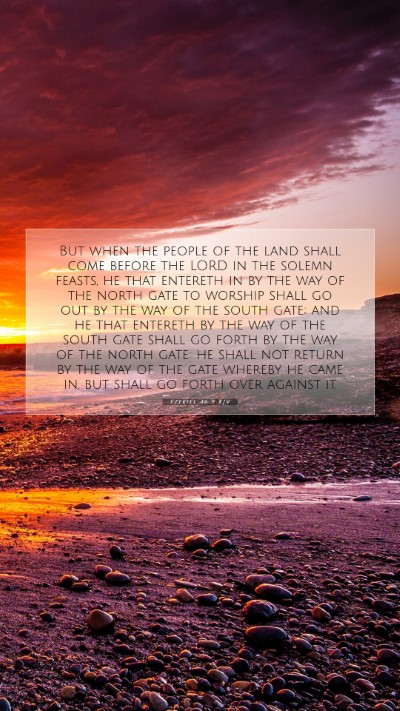Ezekiel 46:9 - Understanding the Bible Verse
Bible Verse: Ezekiel 46:9
Scripture: "But when the people of the land come before the Lord at the appointed feasts, he who enters by the way of the north gate to worship shall go out by the way of the south gate, and he who enters by the way of the south gate shall go out by the way of the north gate; he shall not return by the gate through which he came, but shall go out through the opposite gate."
Bible Verse Commentary
The interpretation of Ezekiel 46:9 is multifaceted, reflecting various layers of meaning within the historical and theological context of the text. The verse denotes a specific instruction regarding the worship practices in the Temple that Ezekiel envisions.
Contextual Analysis
This passage is part of Ezekiel's vision regarding the future Temple and the restoration of proper worship for the Israelites. Here, we see a divine directive on the process of entering and exiting the Temple during significant religious celebrations.
Insights from Commentary
- Matthew Henry: Henry emphasizes that these regulations were reflective of God's order and the sacredness of the worship space. He notes that the movement through different gates symbolizes the idea that worship transforms the worshiper, signifying that one must enter into God's presence with reverence and exit with renewed purpose.
- Albert Barnes: Barnes points out the significance of directional movement – that entering one way and exiting another illustrates a complete revelation of God’s holiness. Each direction suggests a different aspect of the worship experience and the transformation it brings.
- Adam Clarke: Clarke elaborates on the ritualistic elements of the passage and mentions that such guidelines were crucial to establish and maintain holiness during worship, indicating that every aspect of worship was designed to reflect God’s majesty.
Meanings Behind the Instruction
The practical application of Ezekiel 46:9 can be explored through several lenses:
- Reverence in Worship: The directive to use different gates highlights the importance of approaching God with respect and the understanding that worship is not routine but a transformative encounter.
- Order in Worship: The structured approach denotes that God values order in worship. Every action taken during worship is imbued with meaning and significance, reinforcing the idea that worship should be approached with intentionality.
- Symbolism of the Gates: The gates serve as symbols of the passage from the secular to the sacred, urging worshipers to leave behind their worldly concerns while engaging with the divine.
Applications of Ezekiel 46:9 in Modern Context
For contemporary believers, Ezekiel 46:9 offers valuable lessons on worship:
- It encourages self-examination before entering a place of worship, prompting individuals to leave distractions behind.
- It serves as a reminder that the act of worship is multifaceted, comprising behavior, attitude, and intention.
- This verse inspires believers to approach the task of worship with seriousness, acknowledging that every entry and exit represents a movement toward or away from God’s presence.
Bible Cross References
This verse can be further understood in light of several related scripture passages:
- Exodus 20:24: The importance of altars and sacred spaces.
- Psalms 24:3-4: Who may ascend the hill of the Lord reflects the need for purity in worship.
- 1 Corinthians 14:40: Let all things be done decently and in order emphasizes the significance of orderly worship.


